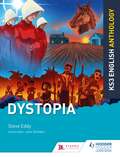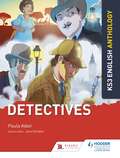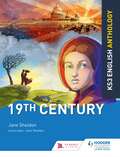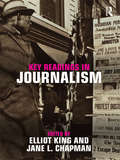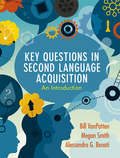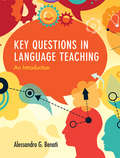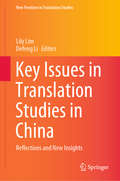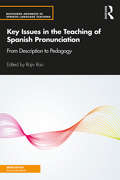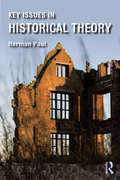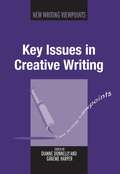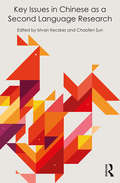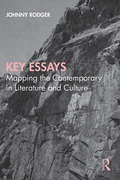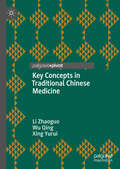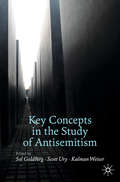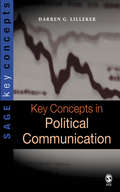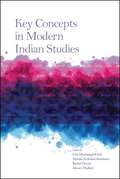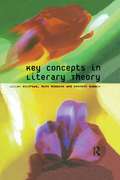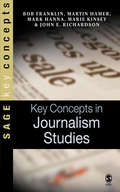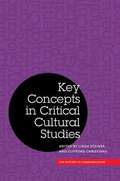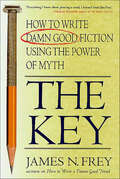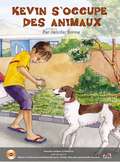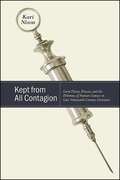- Table View
- List View
Key Stage 3 English Anthology: Dystopia
by Steve EddyInspire your teaching with Key Stage 3 English Anthology: Dystopia, a themed anthology for Year 9. Featuring Animal Farm, The Handmaid's Tale and Lord of the Flies, this Anthology guides students through fiction, non-fiction and poetry, encouraging them to connect with a variety of texts to gain a thorough understanding of the context and literary techniques underpinning each piece of work.Each extract is supported by Teaching and Learning Resources, including quizzes, lesson plans and PowerPoint slides to help you implement the content of the book.Each extract includes:- A context panel to provide key information to set the scene- Glossaries and annotations to help students work through each extract confidently- Look closer: key questions for students to consider as they work through the extracts- Now try this: writing and speaking activities to encourage students to get creative and actively engage with the text- Fast finisher tasks to support students who race ahead- A practice question to familiarise students with the command words they will see at GCSE
Key Stage 3 English Anthology: Dystopia
by Steve Eddy Jane SheldonInspire your teaching with Key Stage 3 English Anthology: Dystopia, a themed anthology for Year 9. Featuring Animal Farm, The Handmaid's Tale and Lord of the Flies, this Anthology guides students through fiction, non-fiction and poetry, encouraging them to connect with a variety of texts to gain a thorough understanding of the context and literary techniques underpinning each piece of work.Each extract is supported by Teaching and Learning Resources, including quizzes, lesson plans and PowerPoint slides to help you implement the content of the book.Each extract includes:- A context panel to provide key information to set the scene- Glossaries and annotations to help students work through each extract confidently- Look closer: key questions for students to consider as they work through the extracts- Now try this: writing and speaking activities to encourage students to get creative and actively engage with the text- Fast finisher tasks to support students who race ahead- A practice question to familiarise students with the command words they will see at GCSE
Key Stage 3 English Anthology: Detectives
by Paula AdairInspire your teaching with Key Stage 3 English Anthology: Detectives, a themed anthology for Year 7. Featuring mysterious page turners starring Sherlock Holmes and Poirot, this Anthology guides students through fiction, non-fiction and poetry, encouraging them to connect with a variety of texts to gain a thorough understanding of the context and literary techniques underpinning each piece.Each extract is supported by Teaching and Learning Resources, including quizzes, lesson plans and PowerPoint slides to help you implement the content of the book.Each extract includes:- A context panel to provide key information to set the scene - Glossaries and annotations to help students work through each extract confidently- Look closer: key questions for students to consider as they work through the extracts- Now try this: writing and speaking activities to encourage students to get creative and actively engage with the text- Fast finisher tasks to support students who race ahead- A practice question to familiarise students with the command words they will see at GCSE
Key Stage 3 English Anthology: Detectives
by Paula Adair Jane SheldonInspire your teaching with Key Stage 3 English Anthology: Detectives, a themed anthology for Year 7. Featuring mysterious page turners starring Sherlock Holmes and Poirot, this Anthology guides students through fiction, non-fiction and poetry, encouraging them to connect with a variety of texts to gain a thorough understanding of the context and literary techniques underpinning each piece.Each extract is supported by Teaching and Learning Resources, including quizzes, lesson plans and PowerPoint slides to help you implement the content of the book.Each extract includes:- A context panel to provide key information to set the scene - Glossaries and annotations to help students work through each extract confidently- Look closer: key questions for students to consider as they work through the extracts- Now try this: writing and speaking activities to encourage students to get creative and actively engage with the text- Fast finisher tasks to support students who race ahead- A practice question to familiarise students with the command words they will see at GCSE
Key Stage 3 English Anthology: 19th Century
by Jane SheldonInspire your teaching with Key Stage 3 English Anthology: 19th Century, a themed anthology for Year 9. Featuring Austen, Brontë and Tennyson, this Anthology guides students through fiction, non-fiction and poetry, encouraging them to connect with a variety of texts to gain a thorough understanding of the context and literary techniques underpinning each piece.Each extract is supported by Teaching and Learning Resources, including quizzes, lesson plans and PowerPoint slides to help you implement the content of the book.Each extract includes:- A context panel to provide key information to set the scene- Glossaries and annotations to help students work through each extract confidently- Look closer: key questions for students to consider as they work through the extracts- Now try this: writing and speaking activities to encourage students to get creative and actively engage with the text- Fast finisher tasks to support students who race ahead- A practice question to familiarise students with the command words they will see at GCSE
Key Stage 3 English Anthology: 19th Century
by Jane SheldonInspire your teaching with Key Stage 3 English Anthology: 19th Century, a themed anthology for Year 9. Featuring Austen, Brontë and Tennyson, this Anthology guides students through fiction, non-fiction and poetry, encouraging them to connect with a variety of texts to gain a thorough understanding of the context and literary techniques underpinning each piece.Each extract is supported by Teaching and Learning Resources, including quizzes, lesson plans and PowerPoint slides to help you implement the content of the book.Each extract includes:- A context panel to provide key information to set the scene- Glossaries and annotations to help students work through each extract confidently- Look closer: key questions for students to consider as they work through the extracts- Now try this: writing and speaking activities to encourage students to get creative and actively engage with the text- Fast finisher tasks to support students who race ahead- A practice question to familiarise students with the command words they will see at GCSE
Key Readings in Journalism
by Jane Chapman Elliot KingKey Readings in Journalism brings together over thirty essential writings that every student of journalism should know. Designed as a primary text for undergraduate students, each reading was carefully chosen in response to extensive surveys from educators reflecting on the needs of today’s journalism classroom. Readings range from critical and historical studies of journalism, such as Walter Lippmann’s Public Opinion and Michael Schudson’s Discovering the News, to examples of classic reporting, such as Carl Bernstein and Bob Woodward’s All the President’s Men. They are supplemented by additional readings to broaden the volume’s scope in every dimension, including gender, race, and nationality. The volume is arranged thematically to enable students to think deeply and broadly about journalism—its development, its practice, its key individuals and institutions, its social impact, and its future—and section introductions and headnotes precede each reading to provide context and key points for discussion.
Key Questions in Second Language Acquisition: An Introduction
by Bill VanPatten Megan Smith Alessandro G. BenatiThis highly accessible introductory textbook carefully explores the main issues that have driven the field of second language acquisition research. Intended for students with little or no background in linguistics or psycholinguistics, it explains important linguistic concepts, and how and why they are relevant to second language acquisition. Topics are presented via a 'key questions' structure that enables the reader to understand how these questions have motivated research in the field, and the problems to which researchers are seeking solutions. It provides a complete package for any introductory course on second language acquisition.
Key Questions in Language Teaching: An Introduction
by Alessandro G. BenatiInnovative and evidence-based, this introduction to the main concepts and issues in language teaching uses a 'key questions' structure, enabling the reader to understand how these questions have been addressed by researchers previously, and how the findings inform language teaching practices. Grounded in research, theory and empirical evidence, the textbook provides students, practitioners and teachers with a complete introductory course in language teaching. Written in a clear and user-friendly style, and avoiding use of jargon, the book draws upon real-life teaching experiences and scenarios to provide practical advice. A glossary of key terms, questions for discussion and further reading suggestions are included. The book is perfectly suited to language teaching modules on English language, TESOL and applied linguistics courses.
Key Issues in Translation Studies in China: Reflections and New Insights (New Frontiers in Translation Studies)
by Lily Lim Defeng LiThis book revisits a number of key issues in Chinese Translation Studies. Reflecting on e.g. what Translation Studies researchers have achieved in the past, and the extent to which the central issues have been addressed and what still needs to be done, a group of respected scholars share their expertise in order to identify some tangible directions and potential areas for future research. In addition, the book discusses a number of key themes, e.g. Translation Studies as a discipline and its essential characteristics, the cultural dimension in translator training, paradigms of curriculum design, the reform of assessment for professional qualification, acts and translation shifts, the principle of faithfulness in translation, and interpreter’s cognitive processing routes. The book offers a useful reference guide for a broad readership including graduate students, and shares insiders’ accounts of various current topics and issues in Chinese Translation Studies. Given its scope, it is also a valuable resource for researchers interested in translation studies in the Chinese context.
Key Issues in the Teaching of Spanish Pronunciation: From Description to Pedagogy (Routledge Advances in Spanish Language Teaching)
by Rajiv RaoKey Issues in the Teaching of Spanish Pronunciation: From Description to Pedagogy is a resource that encourages Spanish teachers and curriculum designers to increase their incorporation of pronunciation into the classroom. Combining theory and practical guidance, it will help language practitioners integrate the teaching of Spanish pronunciation with confidence and effectiveness. The international group of scholars across its 15 chapters is made up of individuals with well-established research records and training in best pedagogical practices. Key features: A range of topics including vowels, various classes of consonants, prosody, the use of technology, the role of orthography, the importance of both perception and production, individual learner differences, and teacher training; Overviews of descriptive, empirical, and acquisition-based research associated with each aspect of the Spanish sound system; Guidance on the difficulties that teachers face when incorporating the teaching of pronunciation into the classroom; Clear explanations of concepts, accompanied by an abundance of concrete examples and references; Multiple sample activities and lesson plans tailored to different levels and backgrounds of students; A bilingual glossary of terms to help the content reach the widest audience possible. Written in a clear and accessible manner, Key Issues in the Teaching of Spanish Pronunciation is an essential resource for teachers of Spanish at all levels. It is also an excellent reference book for researchers and both undergraduate and graduate university students interested in Spanish phonetics and language acquisition.
Key Issues in Historical Theory
by Herman PaulKey Issues in Historical Theory is a fresh, clear and well-grounded introduction to this vibrant field of inquiry, incorporating many examples from novels, paintings, music, and political debates. The book expertly engages the reader in discussions of what history is, how people relate to the past and how they are formed by the past. Over 11 thematically-based chapters, Herman Paul discusses subjects such as: history, memory and trauma historical experience and narrative moral and political dimensions of history historical reasoning and explanation truth, plausibility and objectivity. Key Issues in Historical Theory convincingly shows that historical theory is not limited to reflection on professional historical studies, but offers valuable tools for understanding autobiographical writing, cultural heritage and political controversies about the past. With textboxes providing additional focus on a range of key topics, this is an attractive, accessible and up-to-date guide to the field of historical theory.
Key Issues in Creative Writing
by Dianne Donnelly Graeme HarperKey Issues in Creative Writing explores a range of important issues that inform the practice and understanding of creative writing. The collection considers creative writing learning and teaching as well as creative writing research. Contributors target debates that arise because of the nature of creative writing. These experts - from the UK, USA and Australia - specifically examine creative writing as a subject in universities and colleges and discuss both the creative knowledge and the critical understanding informing the subject and its future. Finally, this volume suggests ways in which addressing current issues will produce significant disciplinary knowledge that will contribute to the success of creative writing in current and future academic environments.
Key Issues in Chinese as a Second Language Research
by Istvan Kecskes Chaofen SunKey Issues in Chinese as a Second Language Research presents and discusses research projects that serve as theoretical grounding for improving the teaching and learning of Chinese as a second language (CSL) in order to help researchers and practitioners better understand the acquisition, development, and use of CSL. With the exception of the first chapter, which is state-of-the-art, each chapter makes an attempt to bring together theory and practice by focusing on theory building and theory application in practice. The book is organized around areas where most future research is needed in CSL: phonology, semantics, grammar, and pragmatics. Consisting of contributions from an international group of scholars working on cutting-edge research, this is the ideal text for researchers, graduate students, and practitioners in the area of Chinese as a second or foreign language.
Key Essays: Mapping the Contemporary in Literature and Culture
by Johnny RodgerAny level of study within literature and culture requires an engagement with a wider scope of themes, issues and discourses, and these debates are often centred around key ‘essays’. This book examines a wide range of these essays on topics such as posthumanism, racism, feminism, necropolitics, the Anthropocene, gender, Global North/South, neo- and de-colonialism, universals, borders and limits, interspecies relations, blackness, cosmopolitics, epistemology, addiction. The essays selected represent scholars from a range of disciplines, ethnicities, nationalities and genders, and offer readings relevant across the arts and humanities. Each chapter explains why the essay is of vital importance in our contemporary era, introduces and explains the key themes and theories with which it engages, demystifies any complex content and positions it within wider current debates. Covering all of the essential debates that students and academics must engage with, alongside a close analysis and critique of contemporary seminal essays in the debate, this book will be an essential read for students of literature and culture across the arts and humanities.
Key Concepts in Traditional Chinese Medicine
by Li Zhaoguo Wu Qing Xing YuruiThis book offers a comprehensive overview of Chinese medicine terminology translation, defining the most central concepts in Chinese traditional medicine, providing simplified Chinese characters, Mandarin Pronunciation in pinyin, citations for 111 of the most key concepts in traditional Chinese medicine and culture. Covering definitions of terms relating to essence, qi, yin-yang theory, five elements and visceral manifestation in traditional medicine, it offers a selection of English versions of each term in addition to a standard English version, drawing on the translation history of traditional Chinese medicine. It provides a useful resource to understand the fundamental terms of traditional Chinese medicine and culture in Chinese and English, and their relevance to cross-cultural discourse.
Key Concepts in the Study of Antisemitism (Palgrave Critical Studies of Antisemitism and Racism)
by Scott Ury Kalman Weiser Sol GoldbergThis volume is designed to assist university faculty and students studying and teaching about antisemitism, racism, and other forms of prejudice. In contrast with similar volumes, it is organized around specific concepts instead of chronology or geography. It promotes conversation about antisemitism across disciplinary, geographic, and thematic lines rather than privileging a single methodological paradigm, a specific academic field, or an overarching narrative. Its twenty-one chapters by leading scholars in diverse fields address the relationship to antisemitism of concepts ranging from Anti-Judaism to Zionism. Each chapter not only traces the history and major scholarly debates around a key concept; it also presents an original argument, points to avenues for further research, and exemplifies a method of investigation.
Key Concepts in Political Communication (SAGE Key Concepts series)
by Dr Darren LillekerThis is a systematic and accessible introduction to the critical concepts, structures and professional practices of political communication. Lilleker presents over 50 core concepts in political communication which cement together various strands of theory. From aestheticisation to virtual politics, he explains, illustrates and provides selected further reading. He considers both practical and theoretical issues central to political communication and offers a critical assessment of recent developments in political communication.
Key Concepts in Modern Indian Studies
by Gita Dharampal-Frick Monika Kirloskar-Steinbach Rachel Dwyer Jahnavi PhalkeyModern Indian studies have recently become a site for new, creative, and thought-provoking debates extending over a broad canvas of crucial issues. As a result of socio-political transformations, certain concepts—such as ahimsa, caste, darshan, and race—have taken on different meanings. Bringing together ideas, issues, and debates salient to modern Indian studies, this volume charts the social, cultural, political, and economic processes at work in the Indian subcontinent. Authored by internationally recognized experts, this volume comprises over one hundred individual entries on concepts central to their respective fields of specialization, highlighting crucial issues and debates in a lucid and concise manner. Each concept is accompanied by a critical analysis of its trajectory and a succinct discussion of its significance in the academic arena as well as in the public sphere. Enhancing the shared framework of understanding about the Indian subcontinent, Key Concepts in Modern Indian Studies will provide the reader with insights into vital debates about the region, underscoring the compelling issues emanating from colonialism and postcolonialism.
Key Concepts in Literary Theory (Key Concepts In Literature Ser.)
by Julian Wolfreys Ruth Robbins Kenneth WomackThis book provides students with lucid and authoritative definitions of some of the most significant terms and concepts employed in the study of literary theory. It offers 250 terms from many areas of literary theory, including cultural studies, psychoanalysis, poststructuralism, Marxist and feminist studies, postcolonialism, and other areas of identity politics. In addition, it provides definitions of principal areas of literary study, and a chronological chart of major critics and philosophers. Key Concepts in Literary Theory is an indispensable reference work for anyone interested in the complexities of the theories currently discussed in literary and cultural studies.
Key Concepts in Journalism Studies (SAGE Key Concepts series)
by Bob Franklin Martin Hamer Marie Kinsey Dr John E Richardson Mr Mark Hanna'The five authors have drawn on their enormous range of experience in newspaper and broadcast journalism, at national and regional level, as well as their teaching expertise for this book, which will be essential reading for students in journalism, and as invaluable reference tool for their professional careers' -www.HoldtheFrontPage.co.uk 'At long last, the undergraduate journalism A-Z. This is an excellent and much needed resource which should be on the list of every undergraduate journalism and media student' -Tim Rodgers, Kingston College The SAGE Key Concepts series provide students with accessible and authoritative knowledge of the essential topics in a variety of disciplines. Cross-referenced throughout, the format encourages critical evaluation through understanding. Written by experienced and respected academics, the books are indispensable study aids and guides to comprehension. Key Concepts in Journalism offers: - a systematic and accessible introduction to the terms, processes and effects of journalism - a combination of practical considerations with theoretical issues - further reading suggestions The authors bring an enormous range of experience in newspaper and broadcast journalism, at national and regional level, as well as their teaching expertise. This book will be essential reading for students in journalism, and an invaluable reference tool for their professional careers.
Key Concepts in Critical Cultural Studies
by Linda Steiner Clifford ChristiansThis volume brings together sixteen essays on key and intersecting topics in critical cultural studies from major scholars in the field. Taking into account the vicissitudes of political, social, and cultural issues, the contributors engage deeply with the evolving understanding of critical concepts such as history, community, culture, identity, politics, ethics, globalization, and technology. The essays address the extent to which these concepts have been useful to scholars, policy makers, and citizens, as well as the ways they must be rethought and reconsidered if they are to continue to be viable. Each essay considers what is known and understood about these concepts. The essays give particular attention to how relevant ideas, themes, and terms were developed, elaborated, and deployed in the work of James W. Carey, the "founding father" of cultural studies in the United States. The contributors map how these important concepts, including Carey's own work with them, have evolved over time and how these concepts intersect. The result is a coherent volume that redefines the still-emerging field of critical cultural studies. Contributors are Stuart Allan, Jack Zeljko Bratich, Clifford Christians, Norman Denzin, Mark Fackler, Robert Fortner, Lawrence Grossberg, Joli Jensen, Steve Jones, John Nerone, Lana Rakow, Quentin J. Schultze, Linda Steiner, Angharad N. Valdivia, Catherine Warren, Frederick Wasser, and Barbie Zelizer.
The Key: How to Write Damn Good Fiction Using the Power of Myth
by James N. FreyIn his widely read guides How to Write a Damn Good Novel and How to Write a Damn Good Novel II: Advanced Techniques, popular novelist and fiction-writing coach James N. Frey showed tens of thousands of writers how--starting with rounded, living, breathing, dynamic characters--to structure a novel that sustains its tension and development and ends in a satisfying, dramatic climax.Now, in The Key, Frey takes his no-nonsense, "Damn Good" approach and applies it to Joseph Campbell's insights into the universal structure of myths. Myths, says Frey, are the basis of all storytelling, and their structures and motifs are just as powerful for contemporary writers as they were for Homer. Frey begins with the qualities found in mythic heros--ancient and modern--such as the hero's special talent, his or her wound, status as an "outlaw," and so on. He then demonstrates how the hero is initiated--sent on a mission, forced to learn the new rules, tested, and suffers a symbolic death and rebirth--before he or she can return home. Using dozens of classical and contemporary novels and films as models, Frey shows how these motifs and forms work their powerful magic on the reader's imagination.The Key is designed as a practical step-by-step guide for fiction writers and screen writers who want to shape their own ideas into a mythic story.
Kevin S`Occupe Des Animaux class 1 - MIE
by Par Jennifer Bonne"Kevin s'occupe des animaux" est un livre géant conçu pour faciliter l'éveil à la littératie chez les jeunes apprenants. L'histoire suit Kevin, qui, en jouant avec son chien Pixie, découvre que celui-ci s'est blessé à la patte. Avec l'aide de sa maman, il soigne le chien et apprend l'importance de prendre soin des animaux. En explorant son environnement, Kevin observe les changements chez les perruches et découvre différents animaux chez sa voisine, suscitant son désir d'avoir sa propre ferme à l'avenir, tandis qu'Ashley exprime son aspiration à devenir vétérinaire. Le livre encourage l'interaction avec les élèves en les incitant à partager leurs expériences personnelles avec les animaux, tout en visant à développer leur compréhension du vocabulaire et à stimuler leur imagination à travers des activités interactives liées au thème des soins aux animaux.
Kept from All Contagion: Germ Theory, Disease, and the Dilemma of Human Contact in Late Nineteenth-Century Literature (SUNY series, Studies in the Long Nineteenth Century)
by Kari NixonKept from All Contagion explores the surprising social effects of germ theory in the late nineteenth century. Connecting groups of authors rarely studied in tandem by highlighting their shared interest in changing interpersonal relationships in the wake of germ theory, this book takes a surprising and refreshing stance on studies in medicine and literature.Each chapter focuses on a different disease, discussing the different social policies or dilemmas that arose from new understandings in the 1860s–1890s that these diseases were contagious. The chapters pair these sociohistorical considerations with robust literary analyses that assess the ways authors as diverse as Thomas Hardy, Henrik Ibsen, and Mary Elizabeth Braddon, among others, grappled with these ideas and their various impacts upon different human relationships—marital, filial, and social.Through the trifocal structure of each chapter (microbial, relational, and sociopolitical), the book excavates previously overlooked connections between literary texts that insist upon the life-giving importance of community engagement—the very thing that seemed threatening in the wake of germ theory's revelations. Germ theory seemed to promote self-protection via isolation; the authors covered in Kept from All Contagion resist such tacit biopolitical implications. Instead, as Kari Nixon shows, they repeatedly demonstrate vitalizing interpersonal interactions in spite of—and often because of—their contamination with disease, thus completely upending both the ways Victorians and present-day literary scholars have tended to portray and interpret purity.
